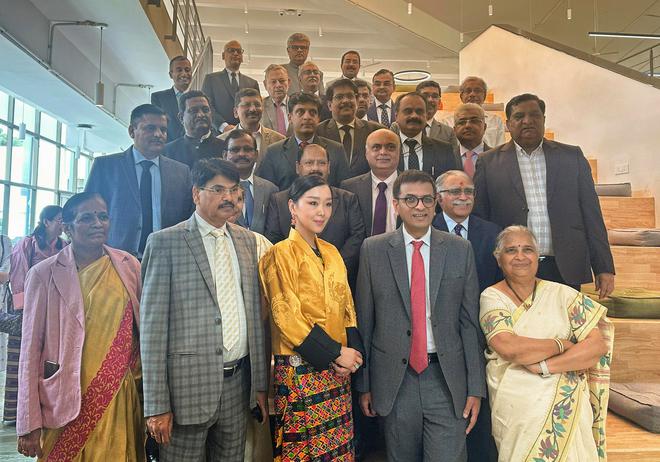“I recently heard a story that left me heartbroken. I was told that a young student who began their internship at a law office was asked by their supervisor which caste they belonged to. Upon hearing the answer, they were told not to return to the office. I was filled with despair when I heard of this incident,” said Chief Justice of India D.Y. Chandrachud while addressing the graduating students at the 31st convocation of the National Law School of India University (NLSIU), Bengaluru, on Saturday.
He continued, “As lawyers, we are keenly aware of society and its injustices. Our duty to practice and uphold constitutional values at every point in our lives is therefore greater than that of a common citizen. Yet, this incident shows some lawyers are violating the law, leave aside upholding constitutional values.”
Open conversations
Speaking of how having open conversations would help in creating equal opportunities for everyone, Mr. Justice Chandrachud said, “Last year, four out of my five law clerks were women. I have frank conversations with them. It is not uncommon for them to give me a call in the morning and say, ‘Sir would it be alright if I worked from home today because I am suffering from menstrual cramps?’ I tell them please feel free to work from home. I am sure you will be doing your work as usual.”
He further said, “It is important that we have these conversations as we cannot believe or pretend that these issues do not exist in our society.” He also spoke about how sanitary napkin dispensers were recently placed in the women’s washrooms at the Supreme Court of India. “These conversations have to take place if we are to make our institutions equal opportunity workplaces.”
With eight students from Ph.D programme, 59 from the Master of Public Policy programme, 68 from the Master of Laws programme, 74 from the Bachelor of Arts and Laws (Honours) programme, and 1,490 students from the Online and Hybrid Education programmes, a total of 1,699 students graduated from the NLSIU on Saturday. The convocation address was given by princess Sonam Dechan Wangchuck, founding president of the JSW School of Law, Bhutan, and president of the Bar Council of Bhutan.
Ms. Wangchuck spoke of justice, service, and wisdom, which she called important and profound qualities. “Justice is the cornerstone of a functional society which upholds and respects the rule of law. Simply put, justice is treating all with equal respect despite the growing inequalities in societies and the world. In this rapidly evolving world, injustice continues to take myriad forms, from technological and knowledge divide to environmental inequalities,” she said.
“As aspiring social engineers, we must find solutions and forge a brighter future based on inclusive decision-making, empathetic action, and equal opportunities. As legal professionals, we are empowered to champion justice through actions as simple as not overcharging fees or by uplifting those marginalised and voiceless through pro bono services,” she added.
340% increase in student intake at NLSIU
Under the NLSIU Inclusion and Expansion Plan, 2021-25, which was adopted in 2019-20, there was a 340% increase in students (from 500 to 2,200), a 300% increase in faculty (from 30 to 120), and a corresponding increase in university infrastructure, administrative capacity, and technology to accommodate the growth, said Sudhir Krishnaswamy, Vice-Chancellor, NLSIU. He also said that to realise the vision of being a fully residential university, the number of beds in hostels were increased from 780 to 1,000 this year.
Prof. Krishnaswamy also said that the research output at the NLSIU had increased by nearly 50% over the last NIRF ranking cycle and a new research policy to democratise leadership of university centres and Chairs and enhance participation of faculty in collaborative research projects, was adopted by the governing body a few days earlier.
Academic Library redeveloped at NLSIU campus

The redeveloped Shri Narayan Rao Melgiri Memorial National Law Library on the NLSIU campus was inaugurated on Saturday by Mr. Justice Chandrachud and princess Wangchuck from Bhutan. Spread over a built-up area of 30,000 sq. ft, the library which could previously seat 250 people can now accommodate 600 people.
Established in 2005, the library was redesigned in the academic year 2022-23 to respond to multiple uses of the community. The library has three floors with access to the terrace and has also been laid with tactile pathways to allow for independent navigation for the specially abled users. It is also equipped with Braille printers, JAWS Talking Reader, desktop magnifiers, smart readers, and Online Daisy Player.
The redevelopment of the library was supported by the Infosys Foundation, the Government of Karnataka and others. “This library, which is among the best academic law libraries in India, has been reimagined to be the hub of intellectual life on campus, with emphasis on collaboration and collective learning. It accommodates the growing student, research, and faculty community and is organised into zones adapted to various uses,” said a press release from the NLSIU.
The university is also working towards digitising all of its out-of-copyright books and documents and uploading them to the Internet Archive where it can be accessed by the public. It has finished digitising 25,000 volumes.







